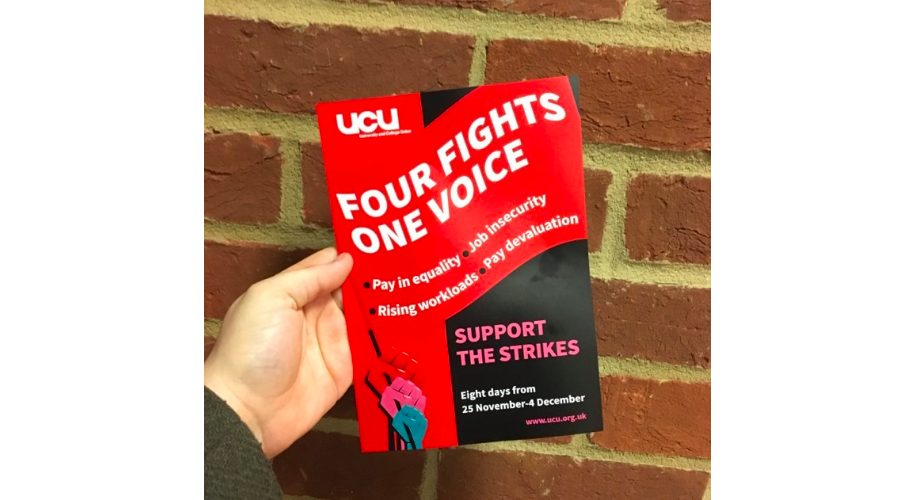Experiencing the UCU strikes at an English university

“Support your lecturers!”, “Don’t go to class!”. These are some of the things that were yelled at me by fellow students as I got off my bus at an enforced earlier stop and walked across picket lines onto my campus during the University and Colleges Union (UCU) strikes. Students across the UK have experienced strikes by teaching staff from the University and Colleges Union (UCU) over the last few years. The latest set of strikes ended on Friday 13th March. It was recently reported that nearly £3m of tuition fee refunds have been given to students to make up for lost teaching time during the industrial action1.
I grew up in Perth and made full use of the Scottish Higher education system by completing my first degree at the University of Strathclyde without having to pay tuition fees. I moved to Brighton in 2017 to complete a PhD at the University of Sussex. I don’t recall being impacted by any strikes during my undergraduate degree and at my partner’s graduation at the University of Edinburgh last year, I saw only peaceful protests. This was a rather stark comparison to the uglier side of these demonstrations I had witnessed on Sussex’s campus over the past few years. Notably, a UK-wide UCU-organised march took place on our campus in March 2018 which we were told to avoid being on campus for.
As a research-based PhD student, I don’t lose out if lecturers go on strike. It’s all on me. If I choose not to come into the lab to work on my experiments, my thesis project doesn’t progress. Thus, I chose to go onto campus during most of the various periods of striking action. Now don’t get me wrong, I support the strikes. The increasing number of staff on temporary contracts is shameful as is the inequality in pay across gender and race – ironically identified in University-published reports. The short term nature of contract research posts has made working in my research group particularly unmotivating at times. There was always at least someone with their contract end date coming up hoping for an extension or trying to look elsewhere without having to move to a new county or country. It always dominated the conversation. We would question whether we should have a Christmas party, or how much we should socialise outside of work if people felt pressured to pull out because they wanted to save money. It’s really put me off a career in academia. Imagine how many brilliant researchers have been lost to the system because of current career prospects?
I’m technically part of the problem when it comes to teaching. I’ve definitely felt guilt as an associated tutor in these times. PhD students are essentially cheap teaching labour. We like doing bits of teaching in and around our studies to top up our stipend allowances. This resulted in many of us signing up to short-term contracts for jobs that are cheaper to run for the university than it is for them to hire a more experienced teaching fellow. We should be able to take advantage of such flexible opportunities but they shouldn’t be the default. The majority of teaching should be delivered by more senior staff who have far more expertise than students who are mostly fresh out of their undergraduate degrees themselves. We are often asked to teach about more general aspects of our subject or topics we care less about than our individual PhD projects which can affect the way we come across in the lessons.
The strikes often affected my day to day life on campus, particularly during my morning commute. If I was driving to campus on a typical strike day, I would prepare to stop at the entrance to campus to wind down my window and take a leaflet if I didn’t already have one. That leaflet would remain on my dashboard so I could skip this step the next day. If I got the bus, the selfish postgraduate in me actually enjoyed the less cramped ride, but it also showed me just how many people were impacted by the strikes. Brighton and Hove bus drivers didn’t drive onto campus in solidarity with the lecturers and we were dropped off nearby instead. Walking across the campus threshold felt more deliberate than driving over a picket line. The following usual events were less fun when you were walking to your office.
Sussex is known for being a hub for students who are after social change – for example, we have the number one ranked international development course in the world which attracts many passionate students2 – so there were often clusters of students also striking shouting at anyone choosing to cross the picket lines. As I said before, I never had classes. I don’t have lecturers. It was frustrating that these additional protestors assumed every young person walking around campus was an undergraduate. Some of us may be vital service workers for keeping services running on campus. I never engaged with these aggressive students. Meanwhile, I never experienced heckling from striking lecturers who always protested peacefully, offering flyers and chanting for their cause rather than jeering at individuals walking past. Staff simply let people continue on their way if they weren’t interested in engaging with the cause.
Towards the end of the first set of strikes during my time in Sussex, a UK-wide demonstration was planned to take place on our campus on Thursday 15th March 2018. This was primarily because our vice-chancellor, Adam Tickle, was on the other side of the negotiation table from the UCU. We were told to stay home – much like we’re experiencing now in Covid-19 times – but it ended up being a relatively small march of 100-200 people from what I heard from those who were present on campus. Despite that demonstration being particularly peaceful, some students hijacked the protest by occupying a set of new student halls being built3. These halls were replacing the cheapest halls on campus with new premium halls, adding to the great cost of studying at a university in England. While this feeds into the wider view that universities are focussing more on producing profits than producing productive learned members of society, it felt inappropriate that they had chosen to invade the unsafe building site to make the protest about themselves. In subsequent protests, many students were also seen protesting primarily about the reduction in quality of their own degrees; rather than the poor conditions staff were expected to work under. These superfluous protests even resulted in students being forced to move by cars4. I hope we don’t see students putting themselves in any more dangerous situations.
I’m sure I would have different views if I was one of them – trying to complete a degree with more teaching elements at the moment, plus paying a premium for the pleasure of cancelled classes – but the strikes should be about the staff, not the students. While their supportive actions are understandable and in many ways commendable, I was more aware of the additional action on campus by a small number of particularly disgruntled students than the main strikes by teaching staff. Teaching staff care about their students and I believe they are only striking because they see no other option. We shouldn’t hijack their demonstrations for our own injustices. We should be standing alongside them until being an academic is once again a fair and stable career option for those passionate about solving the world’s problems.
This article was specialist edited by Juliet Hannay and copy-edited by Deep Bandivadekar.
References
- www.independent.co.uk/news/education/education-news/university-strikes-students-compensation-tuition-fee-refunds-ucu-lecturer-a9395481.html
- www.topuniversities.com/university-rankings/university-subject-rankings/2020/development-studies
- www.brightonandhovenews.org/2018/03/15/students-occupy-building-site-in-strike-and-rent-protest/
- https://thebadgeronline.com/2020/03/breaking-students-supporting-strikes-hit-by-cars-on-campus/










